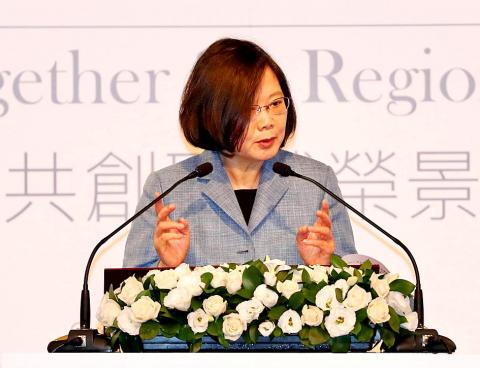The New Southbound Policy launched by her administration after her inauguration two years ago is bearing fruit with closer ties in terms of trade, and economic and cultural exchanges between Taiwan and nations targeted by the policy, President Tsai Ing-wen (蔡英文) said yesterday.
In an address at the opening of the Yushan Forum in Taipei, Tsai said there have been some significant results since the policy’s launch.
For instance, in the first half of this year, Taiwan welcomed more than 41,000 students from New Southbound nations, she said, adding that the number would rise again next year as the government has set a goal of 48,000 students.

Photo: CNA
“Our young people are also choosing New Southbound countries as their study destination. Last year, the number of Taiwanese students studying in those countries increased by nearly 20 percent [compared with the previous year],” she said.
In addition, more than 4 million tourists have visited Taiwan over the past two years from New Southbound Policy nations, which is helping to forge closer people-to-people ties, she added.
Bilateral trade between Taiwan and those nations has also increased significantly, Tsai said.
“Last year alone, bilateral trade between Taiwan and New Southbound countries grew by around 15 percent year-on-year. Taiwan’s investment in those countries rose by 54 percent and approved investment from those countries in Taiwan also increased by about 15 percent,” she said.
The president said the two-day Yushan Forum, which was launched last year to promote Taiwan’s regional status and support the government’s efforts to forge a broader relationship with nations targeted by the New Southbound Policy, is a “unique platform celebrating diversity, innovation and progressive values.”
Tsai said she hopes the forum will become one of Asia’s premier events on regional affairs and cooperation.
To conclude her remarks, she borrowed a quote from former Philippine vice president Teofisto Guingona Jr, who said at last year’s inaugural Yushan Forum: “We help each other. The Philippines to help Taiwan, and Taiwan to help the Philippines.”
Tsai said the quote exemplified the spirit of the forum and the New Southbound Policy as a whole, which is “Taiwan can help Asia, and Asia can help Taiwan.”
Forty-eight speakers from 18 nations are attending the forum.

INVESTIGATION: The case is the latest instance of a DPP figure being implicated in an espionage network accused of allegedly leaking information to Chinese intelligence Democratic Progressive Party (DPP) member Ho Jen-chieh (何仁傑) was detained and held incommunicado yesterday on suspicion of spying for China during his tenure as assistant to then-minister of foreign affairs Joseph Wu (吳釗燮). The Taipei District Prosecutors’ Office said Ho was implicated during its investigation into alleged spying activities by former Presidential Office consultant Wu Shang-yu (吳尚雨). Prosecutors said there is reason to believe Ho breached the National Security Act (國家安全法) by leaking classified Ministry of Foreign Affairs information to Chinese intelligence. Following interrogation, prosecutors petitioned the Taipei District Court to detain Ho, citing concerns over potential collusion or tampering of evidence. The

‘FORM OF PROTEST’: The German Institute Taipei said it was ‘shocked’ to see Nazi symbolism used in connection with political aims as it condemned the incident Sung Chien-liang (宋建樑), who led efforts to recall Democratic Progressive Party (DPP) Legislator Lee Kun-cheng (李坤城), was released on bail of NT$80,000 yesterday amid an outcry over a Nazi armband he wore to questioning the night before. Sung arrived at the New Taipei City District Prosecutors’ Office for questioning in a recall petition forgery case on Tuesday night wearing a red armband bearing a swastika, carrying a copy of Adolf Hitler’s Mein Kampf and giving a Nazi salute. Sung left the building at 1:15am without the armband and apparently covering the book with a coat. This is a serious international scandal and Chinese

Seventy percent of middle and elementary schools now conduct English classes entirely in English, the Ministry of Education said, as it encourages schools nationwide to adopt this practice Minister of Education (MOE) Cheng Ying-yao (鄭英耀) is scheduled to present a report on the government’s bilingual education policy to the Legislative Yuan’s Education and Culture Committee today. The report would outline strategies aimed at expanding access to education, reducing regional disparities and improving talent cultivation. Implementation of bilingual education policies has varied across local governments, occasionally drawing public criticism. For example, some schools have required teachers of non-English subjects to pass English proficiency

TRADE: The premier pledged safeguards on ‘Made in Taiwan’ labeling, anti-dumping measures and stricter export controls to strengthen its position in trade talks Products labeled “made in Taiwan” must be genuinely made in Taiwan, Premier Cho Jung-tai (卓榮泰) said yesterday, vowing to enforce strict safeguards against “origin laundering” and initiate anti-dumping investigations to prevent China dumping its products in Taiwan. Cho made the remarks in a discussion session with representatives from industries in Kaohsiung. In response to the US government’s recent announcement of “reciprocal” tariffs on its trading partners, President William Lai (賴清德) and Cho last week began a series of consultations with industry leaders nationwide to gather feedback and address concerns. Taiwanese and US officials held a videoconference on Friday evening to discuss the